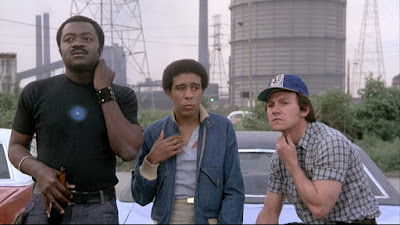“Blue Collar” (1978) is about three Michigan auto workers – Zeke (Richard Pryor), Jerry (Harvey Keitel), and Smokey (Yaphet Kotto) – who decide to rob a safe at their American Auto Workers Union headquarters. That might make it sound like a heist movie, but Paul Schrader’s directorial debut is not a heist movie, not really. No, in most heist movies the planning and execution of the caper is elaborate, dramatic; in “Blue Collar,” on the other hand, the heist is almost casual, rendered with no suspenseful music, just the three men finding the safe door open, and when a security guard shows up, the disguises the three men don, a propeller hat, googly eye glasses, and a hat with an arrow through the head, underline the absurdity of both the heist itself and the fallout. All they find is $600, if also a ledger that exposing the union’s illegal loan operation and ties to the mob, providing Zeke, Jerry, and Smokey an opportunity to get rich through blackmail. That their blackmail scheme backfires probably goes without saying, though this proves more profound than pure fatalism, a dramatic unmasking of the working life myth as something more sinister, less Alabama’s “Forty Hour Week (For a Livin’)” or a Bob Seger Chevy commercial than the Captain Beefheart kick in the teeth that plays over the opening credits.
Despite such darkness, Schrader takes care in conveying a sense of camaraderie. The production stories, in fact, that a frustrated Keitel threw an ashtray at camera over Pryor’s improvisational acting style, that Pryor pointed a gun at Schrader, that Schrader almost had a nervous breakdown, in no way make it to the screen. No, on the screen the three auto workers bond and get along, illustrated in how Schrader likes to place them together in the same frame, on couches and in the front seat of cars, letting us revel in them as a real trio. There’s a tenderness to the performances of Keitel and Pryor too. The former struggles to provide for his family yet the character is neither written nor played as someone who has become belligerent on account of the financial pressure. A tiny subplot in which Jerry’s daughter tries to place makeshift braces on her teeth because her family can’t afford them is not just a catalyst for pushing Jerry to break the law but a heartbreaking evocation of economic desperation. Pryor, meanwhile, in scenes where his character tries to fool the IRS by pretending another family’s kids are his own and explains to his wife they watch so much TV because they need to get their money’s worth considering how much it cost, lets his natural penchant for comedy quietly shade into comic tragedy.
If Zeke and Jerry are family men, Smokey is their opposite, a single man, which Schrader consciously portrays as giving him the kind of rebellious leeway the other two don’t have, railing against the power imbalance between them and their duplicitous union. He’s also in debt to a loan shark, the one detail that does not feel baked enough into the script, too obviously standing out as the necessary means for unwittingly exposing and bringing down the three men and their woebegone plan. Their gradual demise, though, is no less effective. The call Smokey places to Jerry’s wife when he realizes she’s in danger, telling her to get out of the house without telling her to get out of the house, is rendered by Kotto as almost as agonizing as his character’s fate at the hands of the union itself, a slow-moving death sequence in which, trapped, he gradually drowns in paint sprayed from nozzles, the “Star Wars” trash compactor scene of one year earlier evinced in the language of cold blooded murder.
Zeke, on the other hand, stays alive by cooperating, earning a desired promotion to keep quiet, though the real power here comes from the way Pryor plays it, letting all the air of his heretofore vibrant performance seep out, shining on a stark light on the inevitable inhumanity of being made to play ball. The union tries to get Jerry to go along too, though he refuses, his and Zeke’s friendship wilting and then turning rotten. Indeed, if “Blue Collar” is aware of the power disparity, so too is it cognizant of the racial disparities, and when Jerry deploys the N word, it is not cluelessly crude but startlingly revealing. This racial resentment is stoked less by an inherent attitude than the surrounding system that fosters and then unleashes that attitude, which is just the way it’s designed, a moment speaking so clearly for itself that you wish Schrader hadn’t over-emphasized it with that punctuating voiceover. Still.





No comments:
Post a Comment